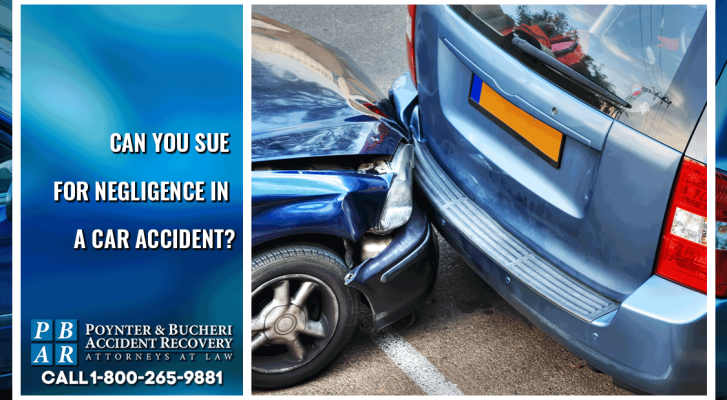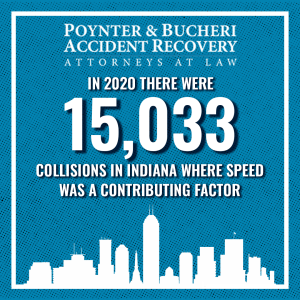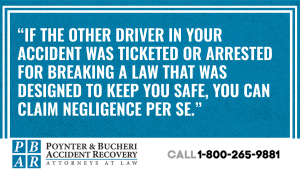
What is Negligence Per Se in a Car Accident Case?

As a society, we tend to use the word “negligence” to mean any kind of neglect, but it has a more specific meaning when used legally. Furthermore, there is a difference between negligence and negligence per se.
Negligence
The negligent definition is “failing to take proper care in doing something.” This applies to many instances, including car accidents. If you have been involved in a car accident with an at-fault driver, to prove negligence in a personal injury case, you and your lawyer will need to prove several factors to be true:
- It is already accepted that the other driver had a duty of care towards you. This means that they needed to operate their motor vehicle in a reasonable manner that would not endanger you or anyone else.
- You will need to prove that the other driver breached that duty of care. In other words, he or she did something that affected your safety (caused the accident).
- You now must prove that your injuries were caused by that breach of duty of care.
- Finally, you must prove that your injuries (caused by the accident – which was in turn caused by the other driver’s unsafe actions) have caused financial losses for you.
Negligence Per Se Elements
Per se literally means “by itself” in Latin. Proving negligence per se is a little easier because you don’t have to go out of your way to prove that the other driver owed you a duty of care or breached this duty. It will already be an accepted matter because the other driver broke an Indiana negligence law.
To claim negligence per se in a civil lawsuit, once it has been established that the other driver is criminally liable, you (the plaintiff) only need to prove that:
- The law that was broken was intended to keep people safe from car accidents. Since Indiana’s rules of the road are designed for safety, this shouldn’t be a problem.
- You are a member of the class of people that the law was intended to protect. This also won’t be an issue, because you were another driver on the road.
- The law violation (and resulting accident) is what caused your injury.
- Your injury caused you financial harm.
Examples of Indiana Laws:
If the other driver in your accident was ticketed or arrested for breaking a law that was designed to keep you safe, you can claim negligence per se.
Here are some obvious examples:

- Impaired driving: Depending upon the level of alcohol in the blood, this may be either a Class A or a Class C misdemeanor. Driving under the influence of a controlled substance listed in Schedule I or II of IC 35-48-2 is also a Class C misdemeanor.
- Speeding: In 2020, there were 15,033 collisions in Indiana where speed was listed as a contributing factor, according to a report published by the Indiana University Public Policy Institute.
- Failure to stop at a stop sign or light. If a driver fails to stop or yield when they are required to, they will be issued a citation for violating a statute.
- Disobeying Indiana’s hands-free law: In 2011, the state of Indiana passed a law prohibiting texting and driving. That law didn’t quite go far enough (people are distracted by their phones for many reasons, not just texting), so on July 1, 2020, the state’s hands-free law went into effect. This prohibits drivers from holding any telecommunication device in their hands for any reason while driving. Drivers are allowed to mount a phone on the dashboard with GPS, and they are also allowed to listen to podcasts or talk on the phone as long as they use Bluetooth and don’t have to touch their phones.
What if the At-Fault Driver Was Not Issued a Ticket or Arrested at the Scene?

You may still be able to prove negligence per se, but it will be more difficult. An experienced Indianapolis car accident lawyer may be able to help you use evidence to support your case. At Poynter & Bucheri, we collect evidence such as:
- Photographs, video footage, and physical evidence
- Witness testimony
- A copy of the police accident report
Can You Sue for Negligence in a Car Accident?
In Indiana, you can pursue a lawsuit against the negligent party who caused your injuries from a car accident. The statute of limitations is two years after the incident to file a claim. Sometimes even cases that seem obvious and clear-cut can be difficult to prove. That’s why you need an aggressive and dedicated personal injury attorney to fight for your rights. An experienced Indianapolis car accident attorney knows how to prove negligence and can guide you every step of the way during your case and recovery. At Poynter & Bucheri Law Firm, we charge no attorney fees, unless you win. Call today for a free case review at 1-800-265-9881, or contact us online.
